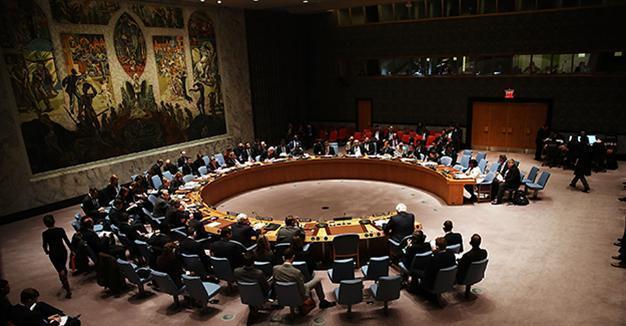UN Security Council divided on Turkey’s strikes on northern Syria
ISTANBUL

United Nations Security Council. AFP Photo
The United Nations Security Council does not have any consensus at the moment on Turkey’s strikes on northern Syria, the council’s president for February has told reporters, correcting previous statement that all member states asked Turkey to “comply with international law” on Feb. 16.Venezuelan Ambassador Rafael Ramirez told reporters following a closed-door meeting on Feb. 16 that the 15 council members “expressed concern about the Turkish attacks in northern Syria.”
“All members of the Security Council are agreed to ask Turkey to comply with international law,” said Ramirez, after a meeting where the 15-member council discussed Turkey’s military action at the request of Russia.
Turkey began shelling northern Syria on Feb. 13, targeting Democratic Union Party (PYD) forces that it says are linked to the outlawed Kurdistan Workers’ Party (PKK).
Ramirez later held another news conference, following a council meeting on Iraq, where he was asked whether his earlier remarks were a mistake.
“We expressed this morning the concern about the situation, but we don’t have any [end result]. I have to be clear to everybody, we don’t have any product, any press statement, presidential declaration, any resolution about this issue,” he said, according to reports by Turkey’s state-run Anadolu Agency.
When asked if all 15 council members expressed concern about Turkey’s actions, he said the members “expressed their concern about that situation, about the bombing of humanitarian facilities, about the many issues, very complicated issues,” but admitted that the council does not have a common stance that was agreed upon by all its members.
Meanwhile, representatives of Russia and Syria conveyed their remarks from the council meeting to reporters, accusing Turkey of “inappropriate behavior” and “escalation.”
Russian Deputy Ambassador Vladimir Safronkov said he had asked Turkey’s allies at the council to “send the appropriate strong signal – stop your inappropriate behavior in Syria.”
Syrian Ambassador Bashar Jaafari claimed that Turkey had been “trying to pull everybody into this nightmare, into this escalation.”
The fighting has cast doubt over whether a cease-fire agreed at a meeting of world powers in Munich last week will materialize, ahead of new round of peace talks in Geneva on Feb. 25.
“Declaring a cease-fire would take much longer than a week,” said Jaafari. “Such a decision cannot be theoretical.”
Meanwhile, Turkey on Feb. 15 accused Russia of an “obvious war crime” after missile attacks in northern Syria killed scores of people, and warned the People’s Protection Units (YPG), the militia force of the PYD, it would face the “harshest reaction” if it tried to capture the town of Azez near the Turkish border.
















